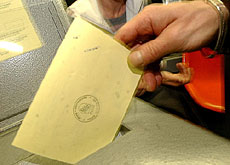
Swiss have voted on cementing EU ties

Swiss voters had the final word on Sunday on whether a labour accord with the European Union should include the ten new EU member states.
Latest opinion polls predicted a close race between the “yes” and “no” camps in the second ballot this year on relations with Brussels.
Supporters say extension of the treaty will lead to economic growth, while opponents argue it would open the doors to a flood of immigrants.
Bern and Brussels concluded a first set of treaties in 1999, which included a gradual opening up of their respective labour markets. The deal came into force in 2002.
With the extension of the EU to 25 members in 2004 Switzerland had to negotiate an agreement with the ten new members, mainly in eastern Europe.
The Swiss parliament approved the deal, but small parties on the far-right and left of the political spectrum challenged the decision to a nationwide vote. They were supported by the rightwing Swiss People’s Party.
Under the accord, Switzerland and the new EU member countries would grant mutual access to their labour markets but only after a period of transition which would include the use of quotas.
Parliament has also endorsed a set of additional measures aimed at preventing a massive influx of cheap labourers from undercutting salary levels.
Boost or threat?
Supporters of the so-called free movement of people say the labour accord would secure jobs in Switzerland and keep the country attractive for foreign investors and Swiss companies.
The government has warned that rejection of the deal would damage Switzerland’s image and seriously hinder the country’s export-driven economy.
The business community, the trade unions and three of the four leading parties have come out in favour of the accord.
Opponents have expressed fears about rising unemployment, currently at 3.6 per cent, if Switzerland opens its market to the 75 million citizens from the new EU member countries.
There are also widespread concerns about salary dumping as a result of increased competition and that the country’s social-security system could become overburdened.
Close race
The latest opinion poll, carried out by the GfS Bern Institute at the beginning of September, found a 50 per cent approval rate among potential voters, while opponents increased their share to 38 per cent.
Experts predict a close race, as the 12 per cent still undecided are thought more likely to side with the “no” camp.
Sunday’s vote is the latest in a series of ballots on Swiss-EU relations.
Three months ago the Swiss voted in favour of closer cooperation with Brussels on security and asylum when they agreed to join the EU’s Schengen/Dublin treaties.
swissinfo
A labour accord between Switzerland and the EU is to be gradually extended to the ten new member states in eastern Europe.
The group is made up of the three Baltic republics (Latvia, Lithuania, Estonia), Poland, the Czech Republic, Slovakia, Hungary, Slovenia, Malta and Cyprus.
The Swiss parliament also approved a series of measures to prevent salary dumping and an undercutting of labour standards.
1992: Swiss voters reject European Economic Area Treaty.
1997: Electorate rejects proposal for nationwide vote on membership negotiations and withdrawal of request for membership talks.
2000: Swiss voters approve first set of bilateral accords with EU.
2001: Rejection of proposal to launch full EU membership negotiations.
2005: Voters approve closer police cooperation with EU (Schengen/Dublin accords) as part of bilateral accords II.

In compliance with the JTI standards
More: SWI swissinfo.ch certified by the Journalism Trust Initiative

























You can find an overview of ongoing debates with our journalists here . Please join us!
If you want to start a conversation about a topic raised in this article or want to report factual errors, email us at english@swissinfo.ch.